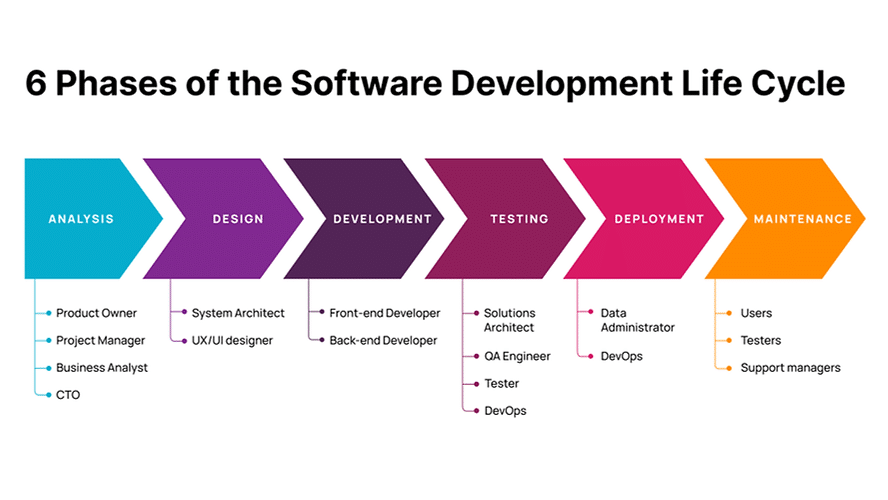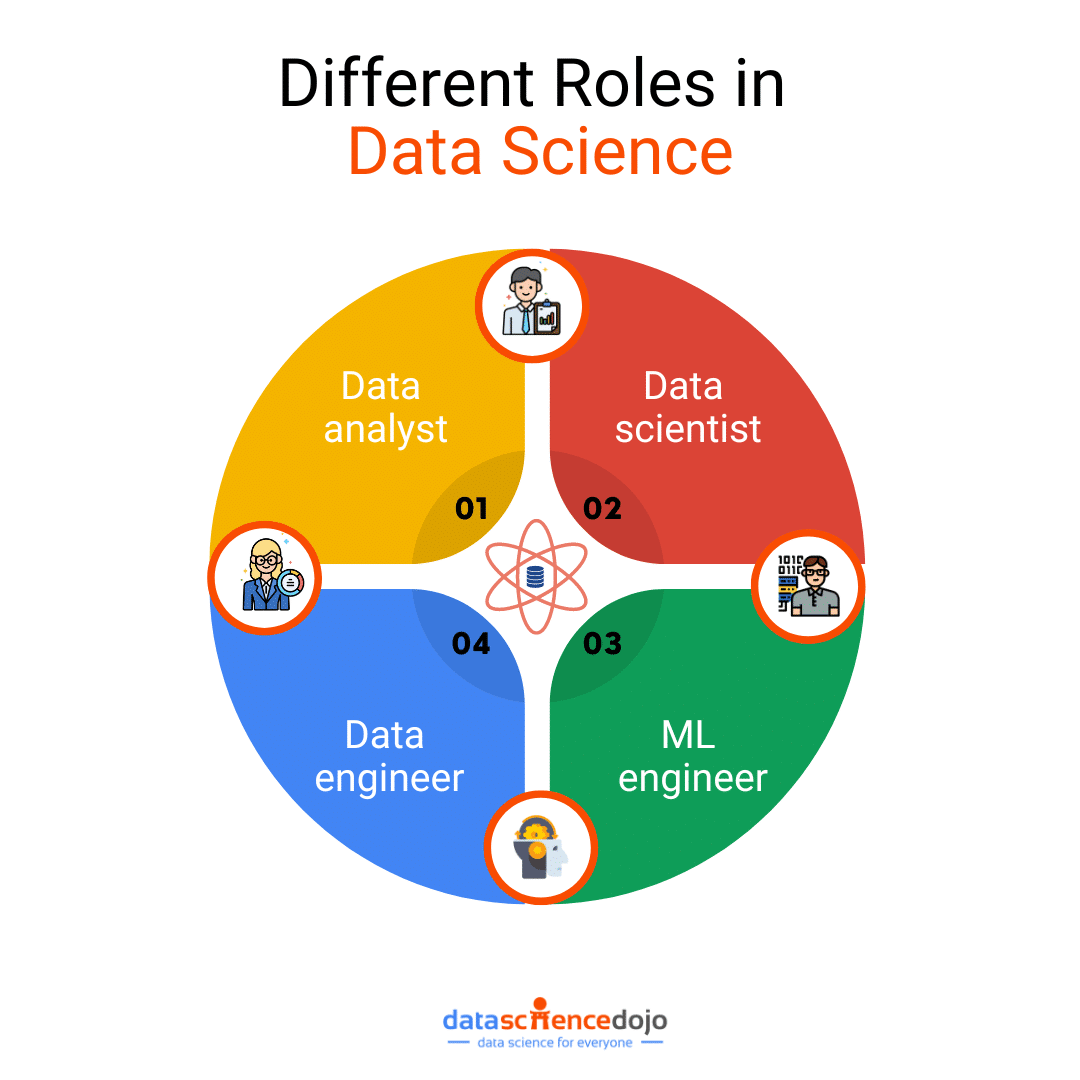The demand for computer science professionals is experiencing significant growth worldwide. According to the Bureau of Labor Statistics, the outlook for information technology and computer science jobs is projected to grow by 15 percent between 2021 and 2031, a rate much faster than the average for all occupations.
This surge is driven by the increasing reliance on technology in various sectors, including healthcare, finance, education, and entertainment, making computer science skills more critical than ever.
Understanding the various career paths within the field of computer science is crucial for aspiring professionals. They can then identify and focus on a specific area of interest to make themselves more marketable and stand out in the competitive job market.
Moreover, knowledge of different career opportunities allows individuals to align their education and skill development with their long-term career goals, ensuring a fulfilling and successful professional journey. In this blog, we will explore the top computer science major jobs for individuals.
What Jobs Can You Get with a Computer Science Degree?
The field of computer science offers a range of career opportunities, each with its own unique roles, responsibilities, and skill requirements. Let’s explore the top computer science jobs to target as you kickstart your journey in the field.
1. Software Developer
Software Developers create and develop websites, programs, and other applications that run on computers or other devices. They are responsible for the entire software development process, from initial design and coding to testing and debugging.
Software developers often work on a variety of projects, ensuring that the software they create is functional, efficient, and user-friendly. Their responsibilities also include updating and improving existing software to meet user needs and incorporating new technologies as they emerge.
Importance of a Software Developer
The role of a Software Developer is crucial in today’s technology-driven world. They play a vital part in the development of new software solutions, applications, and systems that businesses and individuals rely on daily.
This role is about writing code, solving complex problems, improving efficiency, and enhancing the user experience. The work of software developers directly impacts productivity, communication, entertainment, and various other aspects of modern life, making it an important career in the tech industry.
Explore the top 5 no-code AI tools for software developers
Key Skills Required
- Proficiency in programming languages such as Python, C++, and JavaScript.
- Strong problem-solving and critical-thinking abilities.
- Attention to detail and the ability to manage multiple aspects of development effectively.
- Excellent interpersonal skills for effective collaboration with team members.
- Creativity to develop innovative solutions and improve existing systems.

Future of the Role
According to the U.S. Bureau of Labor Statistics, software development jobs are projected to grow by 25% from 2022 to 2032, a rate much faster than the average for all occupations.
This growth is driven by the increasing demand for new software applications, the expansion of mobile technology, and the need for cybersecurity solutions. As technology continues to evolve, software developers will be at the forefront of innovation, working on cutting-edge projects.
2. Information Security Analyst
Information Security Analysts are responsible for protecting an organization’s computer networks and systems. They implement security measures to safeguard sensitive data and prevent cyberattacks.
Their key duties include developing security strategies, installing protective software such as firewalls, monitoring systems for breaches, and responding to incidents. They must also conduct regular tests to identify vulnerabilities and recommend improvements to enhance security protocols.
Importance of an Information Security Analyst
In today’s digital age, where organizations and individuals face an increasing number of cyber threats, data breaches can lead to significant financial losses, reputational damage, and legal repercussions.
Information Security Analysts ensure that a company’s digital infrastructure is secure, maintaining the integrity and confidentiality of data. This role is essential for building trust with clients and stakeholders, thereby supporting the overall stability and success of the organization.
Read more about 10 online cybersecurity courses
Key Skills Required
- Attention to Detail: Being meticulous is crucial as the security of an entire organization depends on identifying and addressing potential vulnerabilities.
- Predictive Abilities: The ability to foresee potential security issues and proactively implement measures to prevent them.
- Technical Expertise: Proficiency in various security technologies, including firewalls, intrusion detection systems, and encryption methods.
- Analytical Thinking: Strong analytical skills to evaluate security incidents and devise effective solutions.
- Communication Skills: The ability to educate employees on security protocols and collaborate with other IT professionals.
Future of the Role
The demand for Information Security Analysts is expected to grow substantially. According to the U.S. Bureau of Labor Statistics, employment for this role is projected to grow by 32% from 2022 to 2032, which is much faster than the average for all occupations.
This growth is driven by the increasing frequency and sophistication of cyberattacks, which necessitate advanced security measures. As technology continues to evolve, Information Security Analysts will need to stay updated with the latest security trends and tools, ensuring they can effectively protect against new threats
3. Computer and Information Research Scientist
Computer and Information Research Scientists are at the forefront of technological innovation. They conduct research to develop new technologies and find novel uses for existing technologies.
Their work involves designing experiments to test computing theories, developing new computing languages, and creating algorithms to improve software and hardware performance.
These professionals often collaborate with other scientists and engineers to solve complex computing problems and advance the boundaries of computer science.
Explore the computer science vs data science debate
Importance of a Computer and Information Research Scientist
These scientists drive innovation across various industries by developing new methodologies and technologies that enhance efficiency, security, and functionality. Their research can lead to breakthroughs in fields such as artificial intelligence, machine learning, and cybersecurity, which are essential for the progress of modern society.
Moreover, their work helps solve critical problems that can have a significant impact on economic growth and the quality of life.

Key Skills Required
- Analytical Skills: The ability to analyze complex problems and develop innovative solutions.
- Mathematical Aptitude: Proficiency in advanced mathematics, including calculus and discrete mathematics, which are essential for developing algorithms and models.
- Programming Knowledge: Strong understanding of multiple programming languages to implement and test new technologies.
- Critical Thinking: The capability to approach problems creatively and think outside the box.
- Collaborative Skills: Ability to work effectively with other researchers and professionals to achieve common goals.
Here’s a list of 5 data science competitions to boost your analytical skills
Future of the Role
According to the U.S. Bureau of Labor Statistics, the employment of computer and information research scientists is projected to grow by 23% from 2022 to 2032, which is much faster than the average for all occupations.
This growth is driven by the increasing reliance on technology and the need for innovative solutions to complex problems. As technology continues to evolve, these scientists will play a crucial role in developing new applications and improving existing systems, ensuring they meet the ever-growing demands of various sectors.
4. Web Developers and Digital Designers
Web Developers and Digital Designers are professionals responsible for creating and designing websites and digital interfaces. Their tasks include developing site layout, integrating graphics and multimedia, and ensuring the usability and functionality of the site.
Web developers focus on coding and technical aspects, using languages like HTML, CSS, and JavaScript, while digital designers prioritize aesthetics and user experience, working closely with graphic designers and UX/UI experts to create visually appealing and user-friendly interfaces.
Importance of Web Developers and Digital Designers
The role of Web Developers and Digital Designers is crucial in today’s digital era, where a strong online presence is vital for businesses and organizations. These professionals ensure that websites not only look good but also perform well, providing a seamless user experience.
Effective web design can significantly impact a company’s brand image, customer engagement, and conversion rates. As more businesses move online, the demand for skilled web developers and digital designers continues to grow, making their role indispensable in the tech industry.
Explore the key AI trends in web development
Key Skills Required
- Technical Skills: Proficiency in programming languages such as HTML, CSS, and JavaScript for web developers and familiarity with design tools like Adobe Creative Suite for digital designers.
- Creativity: The ability to create visually appealing and engaging designs that enhance user experience.
- Problem-Solving: Strong problem-solving skills to troubleshoot issues and optimize website performance.
- Collaboration: Working effectively with other designers, developers, and stakeholders to achieve project goals.
- Attention to Detail: Ensuring that all aspects of the website are functional, error-free, and visually consistent.
Future of the Role
The future for Web Developers and Digital Designers looks promising, with a projected job growth of 16% from 2022 to 2032, according to the U.S. Bureau of Labor Statistics. This growth is driven by the increasing reliance on digital platforms for business, entertainment, and communication.
As new technologies emerge, such as augmented reality (AR) and virtual reality (VR), the role of web developers and digital designers will evolve to incorporate these innovations. Keeping up with trends and continuously updating skills will be essential for success in this field.
5. Data Scientist
Data scientists are like detectives for information, sifting through massive amounts of data to uncover patterns and insights using their computer science and statistics knowledge. They employ tools such as algorithms and predictive models to forecast future trends based on present data.
Data scientists use visualization techniques to transform complex data into understandable graphs and charts, making their findings accessible to stakeholders. Their work is pivotal across various fields, from finance to healthcare and marketing, where data-driven decision-making is crucial.

Importance of a Data Scientist
In today’s digital age, data is often referred to as the new oil, and data scientists are the ones who refine this raw data into valuable insights. They play a crucial role in helping organizations make informed decisions, optimize operations, and identify new opportunities.
The work of data scientists can lead to improved products, better customer experiences, and increased profitability. By uncovering hidden patterns and trends, they enable companies to stay competitive and innovative in a rapidly evolving market.
Learn more about the power of data-driven marketing
Key Skills Required
-
Knowledge of Algorithms and Predictive Models: Proficiency in using algorithms and predictive models to forecast future trends based on present data.
-
Data Visualization Techniques: Ability to transform complex data into understandable graphs and charts.
-
Programming Skills: Proficiency in programming languages such as Python, R, Java, and SQL.
-
Statistical and Mathematical Skills: Ability to analyze data and derive meaningful insights.
-
Communication Skills: Explain complex data insights in a clear and concise manner to non-technical stakeholders.
Future of the Role
As businesses continue to collect vast amounts of data, the need for professionals who can analyze and interpret this data will only increase. According to the U.S. Bureau of Labor Statistics, the median salary for data scientists is $103,500 per year, reflecting the high value placed on this expertise.
The future looks promising for data scientists, with advancements in artificial intelligence and machine learning further expanding the scope and impact of their work. As these technologies evolve, data scientists will be at the forefront of innovation, developing new models and methods to harness the power of data effectively.
6. Database Administrator
A Database Administrator (DBA) is responsible for the performance, integrity, and security of a database. Their duties include setting up databases, ensuring these databases operate efficiently, backing up data to prevent loss, and managing user access.
They often work closely with other IT professionals to develop, manage, and maintain the databases that store and organize data crucial to an organization’s operations. They use specialized software to store and organize data, such as customer information, financial records, and other business-critical data.
Decode the SQL vs NoSQL database debate
Importance of a Database Administrator
The role of a Database Administrator is pivotal for any organization that relies on data to make informed decisions, maintain efficient operations, and ensure security. DBAs ensure that databases are not only accessible and reliable but also secure from vulnerabilities and breaches.
This role is crucial for maintaining data integrity and availability, which are fundamental for business continuity and success. Effective database management helps businesses optimize performance, reduce costs, and improve decision-making processes by providing accurate and timely data.
Learn about vector databases and their role in data management
Key Skills Required
- Technical Proficiency: Strong understanding of database management systems (DBMS) like SQL, Oracle, and MySQL.
- Problem-Solving Skills: Ability to troubleshoot and resolve issues related to database performance and security.
- Attention to Detail: Ensuring data accuracy and integrity through meticulous database management practices.
- Security Awareness: Implementing measures to protect data from unauthorized access and breaches.
- Communication Skills: Collaborating with other IT professionals and stakeholders to meet the organization’s data needs.
Future of the Role
The future for DBAs is driven by the increasing volume of data generated across various industries. As organizations continue to amass growing amounts of data, the demand for skilled DBAs is likely to rise.
The U.S. Bureau of Labor Statistics projects a steady demand for Database Administrators, reflecting the critical nature of their role in managing and securing data.
Moreover, the proliferation of big data, cloud computing, and advancements in database technologies will likely expand the scope and complexity of the DBA role, requiring continuous learning and adaptation to new tools and methodologies.
Here’s a list of top vector databases in the market
7. Game Designer
As a game designer, you get to bring the fun and creative side of video games to life. This role involves working on the story, artwork, and overall gameplay experience. Game designers are responsible for conceptualizing the game’s plot, designing characters, and developing the game mechanics that dictate how the game is played.
They work closely with other designers, artists, and programmers to create an engaging and immersive gaming experience. The median salary for game designers, according to the U.S. Bureau of Labor Statistics, is $80,730 per year.
Importance of a Game Designer
Game designers are crucial to the gaming industry as they combine technical skills with creativity to produce games that captivate and entertain players. They are responsible for ensuring that the game is not only fun but also challenging and rewarding.
The success of a video game heavily relies on the designer’s ability to create compelling stories and intuitive gameplay mechanics that keep players engaged. This role is essential in the development process as it bridges the gap between the initial concept and the final playable product.
Key Skills Required
-
Storytelling Skills: Ability to conceptualize plot and design to create engaging game narratives.
-
Programming Proficiency: Knowledge of programming languages such as C++ or Java.
-
Creativity: Ability to generate unique ideas and bring innovative game concepts to life.
-
Technical Skills: Proficiency in using game design software.
-
Collaboration and Teamwork: Game designers often work closely with other developers, artists, and writers, so strong interpersonal and collaborative skills are necessary.
Future of the Role
The gaming industry is continuously evolving, with advancements in technology such as virtual reality (VR) and augmented reality (AR) opening new possibilities for game designers. The demand for innovative and engaging video games is on the rise, driven by a growing global market of gamers.
As technology continues to advance, game designers will need to stay updated with the latest trends and tools to create cutting-edge gaming experiences. The future looks promising for game designers, with opportunities expanding in new and exciting directions.
Major Employers for Computer Science Jobs
The computer science industry is home to some of the world’s most influential and innovative companies. These organizations are not only leading the way in technology advancements but also providing opportunities for computer science professionals.
Let’s look at the top employers in the industry, detailing the computer science major jobs they offer and their impact on the tech landscape.
Microsoft
Founded in 1975 and headquartered in Redmond, Washington, Microsoft is the largest software maker globally. The company employs over 200,000 workers worldwide. Microsoft hires tech professionals in roles like software engineer, data scientist, and solution architect.
Alphabet (Google)
Alphabet is the parent company of Google, one of the world’s biggest internet product creators and suppliers. To advance its mission to “organize the world’s information and make it universally accessible and useful,” Google employs various computer science professionals, including software engineers, UX researchers, and software developers.
Apple
The company behind the iPhone and Mac computers, Apple is a global juggernaut, reporting a quarterly revenue of $119.6 billion in February 2024. Apple offers computer science jobs in hardware, software, services, machine learning, and AI.
Amazon
In addition to online shopping, Amazon offers cloud services, hardware devices, entertainment, and delivery and logistics. Computer science professionals can find jobs in software development, software engineering, and data science at Amazon.
Meta (formerly Facebook)
Originally created in 2004 under the name Facebook, Meta is a tech company that runs social media and communication platforms.
They are also developing augmented and virtual reality tools for social experiences. Meta hires computer science professionals for roles like computer research scientist, security software engineer, product designer, and data scientist.
U.S. Department of Defense (DoD)
The largest government agency in the U.S., the Department of Defense deploys military personnel to help deter war and advance national security.
The department develops quick, agile, advanced technology to protect American lives and interests. DoD jobs for people with computer science degrees include cyber threat analysts, machine learning scientists, and artificial intelligence engineers.
Other notable employers in the computer science industry include Intel, IBM, and Cisco, along with many smaller organizations that also employ computer and IT professionals. These companies offer a wide range of opportunities for computer science graduates, from software development to cybersecurity and data analysis.
Your Next Step: Explore the Field!
Hence, the field of computer science offers a diverse range of exciting and rewarding career opportunities. From software development and cybersecurity to AI and data science, there are countless ways to make a meaningful impact in the tech industry.
With the increasing demand for skilled computer scientists, now is a great time to explore this dynamic and ever-evolving field.






